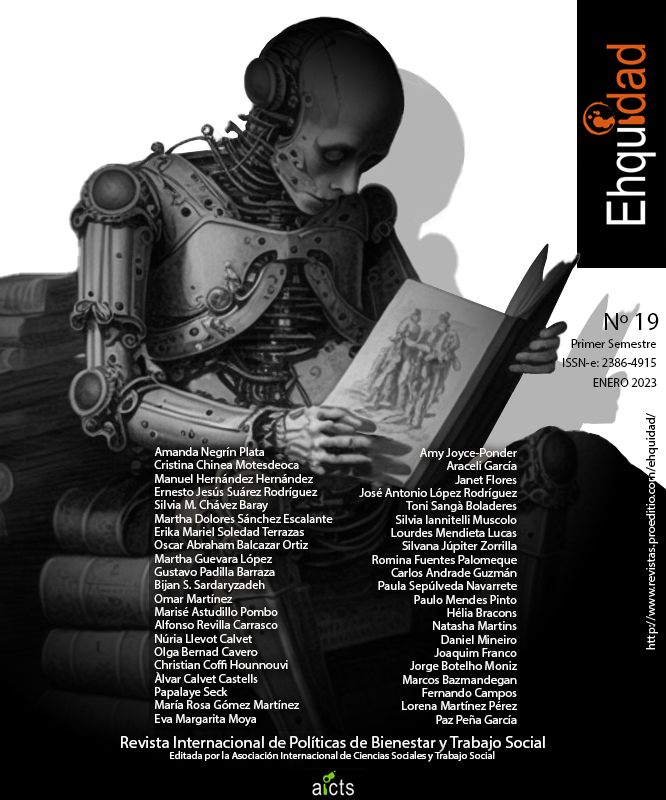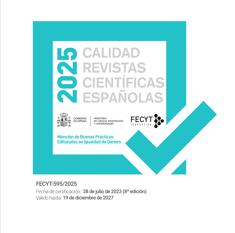Young Africa: art and diaspora.
An experience at the University of Lleida
DOI:
https://doi.org/10.15257/ehquidad.2023.0003Keywords:
Interculturality, Youth, Seminar, Education, Visual ArtsAbstract
This article is the result of an inter-university, international and transdisciplinary experience carried out at the University of X with the collaboration of the University of Y in the academic year 2021-2022, in which other groups and institutions also participated, on Young Africa: art and diaspora. Two seminars were held, a theoretical-practical one with students of the Degree in Social Education on the black-African artistic object as a reference of cultural pluralism and another international seminar with three papers on Art, resilience and rehumanisation, which dealt with music, dance and orality as a resilient therapy in African and Afrodiasporic traditions; an initiative on Top Manta, which is the brand of the commercial project of the Sindicato Mantero and, finally, a practical proposal to intervene from the artistic context in groups at risk, i.e. three proposals combined with an exhibition on Black African masks entitled "Learning to see the invisible".
Downloads
References
Almazán, D. (2015). La influencia del arte negroafricano en el arte de avantguardia. Ponencia dentro del Seminario “Promoure el diàleg intercultural a través d’una mirada a l’art africà” (3 maig de 2017). Universidad de Lleida (documento no publicado).
Alphonce Shiundu (2017). Ser joven en África hoy: las paradojas de las políticas públicas. Africa Check.
Chamoiseau, P. (2006). Conferencia de Chamoiseau Patrick (8 de noviembre, 2006), La Maison des Passages, Lyon, France (grabación personal).
Cyrulnik, B. (1999). Un merveilleux malheur. París
Domingo, J. y Bernad, O. (2017) . Inmigración africana en el contexto rural de Cataluña. Revista Internacional de Estudios Migratorios, 7(1), 9-45
Entiope, G. (1996). Nègre, danse et résistance. La Caraïbe du XVIIè au XIXè siècle. L’Harmattan.
Garreta, J. (2011), Atención a la diversidad cultural en Cataluña: exclusión, segregación e interculturalidad. Revista de Educación, 355, 213-233.
Giroux, H. y Mclaren, P. (1998). Sociedad, cultura y educación. Miño y Dávila Editores.
Hernández, F. (2012). Espigador@a de la cultura visual. Otra narrativa para la educación en las artes visuales. Octaedro.
Jallier, M. y Lossen, Y. (1985). Musique aux Antilles. Éd. Caribéennes.
Kadi, G. A. (2014). La dynamique du zouglou de côte d’ivoire en Afrique francophone. Diogène, 2, 246-247.
Lefevre, S. (2013). Afro-mexicains: les rescape?s d’un naufrage identitaire. Une e?tude a? travers la musique, la danse et l’oralite?. Doctorado defendido el 09 de noviembre de 2013. Universidad Paris X Nanterre. http://www.theses.fr/2013PA100129
Llevot, N. (2012). La importancia del marabout en la educación de la sociedad senegalesa. Arxius de sociologia, 26, 37-50.
Llevot, N. y Bernad, O. (2020). Escuela y religión en Catalunya (España): discursos y prácticas. Educazione Interculturale. Teorie, Ricerche, Pratiche, 18(1), 16-27. https://doi.org/10.6092/issn.2420-8175/10981
Pollak-Eltz, A. (2000). La esclavitud en Venezuela: un estudio histórico-cultural. Universidad Católica de los Andres.
Revilla, A. (2015). Arte africano, educación, cultura e identidad. Editorial Pirineo.
Revilla, A. y Olivares, P. (2019). La interculturalidad desde la Educación Artística. Las posibilidades curriculares a través del Arte Negroafricano. DEDiCA. Revista de Educaçao e Humanidades, 15, 173-184. DOI: 10.30827/dreh.v0i15.822
Revilla, A., Llevot, N., Molet, C., Astudillo, M., y Mauri, J. (2015). El diálogo intercultural a través de una mirada al arte africano: una propuesta educativa interdisciplinar. Ehquidad International Welfare Policies and Social Work Journal, 4, 71-88.
Sardar, Z. y Loon, B.V. (2005). Estudios culturales para todos. Paidos
Schott-Bilmann, F. (2001). Le besoin de danser. Odile Jacob.
Tomàs, J y Farré, A. (2009). Los estudios africanos en España: Balance y perspectivas. Documentos CIDOB, Desarrollo y cooperación, 4(11).
Unesco. (2010). Invertir en la diversidad cultural y el diálogo intercultural. Unesco.












